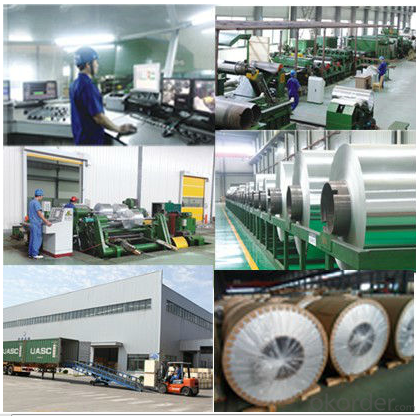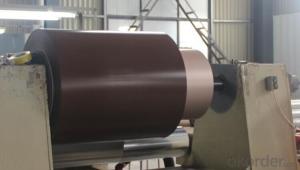Coating Aluminium Coil for Compesite Panel 1100 H18
- Loading Port:
- Qingdao
- Payment Terms:
- TT OR LC
- Min Order Qty:
- 200 m.t.
- Supply Capability:
- 200 m.t./month
OKorder Service Pledge
OKorder Financial Service
You Might Also Like
Item specifice
The Specification of Coated Aluminium
Pop-Up Foil Sheets are individual sheets of Aluminum Coil. Wrappers are so easy to use with all your foods because they pop up one-at-a-time and require no cutting or tearing! Use them for wrapping food to go, as portable place mats, wrapping sandwiches, protecting counters during meal preparation, when making snacks or to store food in the refrigerator.
coated emboss aluminum coil/metal roofing
| |
Aluminum Temper and Grade | Alloys: 1100, 1050, 1100, 3003, 3105, 8011 in a range of standard Temper: O-H112 |
Widths | Max up to 1600mm |
Thickness | 0.02-3.0mm |
Coating | PE or PVDF |
Color | AS per the RAL |
Weight | 1.5-4MT/Coil as per your request |
Packing Detail | Wooden pallet either eye to side or eye to sky
|
Application | Building material such as metal ceiling, roofing, wall cladding panel; Automobiles, etc. |
Rolled up tightly and evenly, smooth sides, uneven difference is less than 2mm, no obvious variation or loose inner core, with no concave outside profile. No more than 1 joint per 500m
The Main Features of Aluminium Coated Coil:
High quality with competive prices.
Wide product range of choice.
We are specific manufacture and control.
The Imagin

FAQ:
Q: Can you provide free samples?
A: Yes, free samples will be sent to you on freight at destination.
Q: Can I get your latest catalogue?
A: Yes, it will be sent to you in no time.
Q: What is the MOQ?
A: 5 tons
Q: What are your payment terms?
A: We accept L/C,T/T, West Union,etc.
- Q:Aluminum inventory of the company, placed for a little longer, there will be surface oxidation, white spot shape, after cleaning into black spots, affecting the use of. Is there a better and convenient way to save it?
- 1. aluminum storage environment should be dry and bright, well ventilated, no corrosion climate.2. aluminum coil should try to avoid the leaks, snow.3. strengthen the management of rolling oil, its moisture content is controlled below zero point zero four percent.4. aluminum rolls should be packed in a sealed package and should be placed in the right amount of desiccant at the same time.5. do not immediately open the sealed package when it is transported from a low temperature zone into a region of high temperature and humidity.6. the humidity of the wooden shaft and box board of the packing box is not more than 18%, and the temperature of the color aluminum roll is not more than 45 degrees.7. aluminum rolls are prohibited from being stored with chemicals and moist materials during storage.
- Q:Are there any restrictions on the coil thickness of aluminum coils?
- Yes, there are typically restrictions on the coil thickness of aluminum coils. The specific restrictions may vary depending on the intended application and industry standards. Generally, the thickness of aluminum coils is limited by the capabilities of the manufacturing equipment and the desired final product. Thinner coils are often preferred for applications that require flexibility, such as in the manufacturing of foils or flexible packaging materials. On the other hand, thicker coils are commonly used in industries like construction or automotive, where strength and durability are important factors. Additionally, the thickness of aluminum coils may be restricted by the availability and cost of raw materials. It is important for manufacturers to adhere to these restrictions to ensure the quality and performance of the final product.
- Q:Besides replacing all the aluminum wiring.
- First find out the Electrical Codes for your city or area. Some don't allow aluminum and you have to have it up to code. Give a call to your city building permit departing and just ask how to find out about the electrical codes for the city first and see if you can recover them, replace them or have an electrician do the work. Tell them you have a friend who is calling about buying a house that has aluminum wire outlets and don't give any information. Building codes may be listed on a town or county's web site or read up on it. Once you know what's allowed, you can decide what to do about it. remember, always be very careful with electricity.
- Q:How are aluminum coils protected against galvanic corrosion?
- Aluminum coils are protected against galvanic corrosion through a combination of surface treatments and protective coatings. One common method is the application of a thin layer of anodization on the aluminum surface. Anodization involves electrolytically treating the aluminum with an acid solution, which creates a protective oxide layer on the surface. This oxide layer acts as a barrier, preventing the direct contact between the aluminum and other metals that may cause galvanic corrosion. Another method is the use of a protective coating, such as a polymer or paint, on the aluminum coils. These coatings provide a physical barrier between the aluminum and the environment, preventing the exposure of the metal to corrosive elements. The coatings are carefully selected to have good adhesion to the aluminum surface and excellent resistance to corrosion. In addition to surface treatments and coatings, proper design and material selection also play a crucial role in protecting aluminum coils against galvanic corrosion. By ensuring that dissimilar metals are not in direct contact and using compatible materials, the risk of galvanic corrosion can be minimized. This can be achieved through the use of isolation materials, such as gaskets or insulating tapes, to separate the aluminum coil from other metals in contact. Regular maintenance and cleaning also contribute to the protection against galvanic corrosion. It is important to remove any accumulated dirt, debris, or corrosive substances from the aluminum coils to prevent the formation of localized corrosion cells. Overall, a combination of surface treatments, protective coatings, proper design, and regular maintenance are essential in protecting aluminum coils against galvanic corrosion. These measures help to extend the lifespan and maintain the performance of the coils in various applications.
- Q:What are the different coil widths available for aluminum coils?
- The different coil widths available for aluminum coils can vary depending on the specific requirements and applications. However, common coil widths for aluminum coils range from as narrow as 1 inch (2.54 cm) to as wide as 72 inches (182.88 cm) or even wider in some cases.
- Q:Are aluminum coils resistant to mold and mildew?
- Yes, aluminum coils are generally resistant to mold and mildew. Aluminum is a non-porous material, which means it does not absorb moisture like other materials such as wood or fabric. This makes it less susceptible to mold and mildew growth. Additionally, aluminum coils are often coated with protective finishes that further enhance their resistance to mold and mildew. However, it is important to note that while aluminum coils are less prone to mold and mildew, they are not completely immune. If the coils are exposed to excessive moisture or humidity, mold and mildew can still develop. Regular cleaning and maintenance are therefore necessary to prevent any potential mold or mildew growth.
- Q:What are the different coil slitting methods used for aluminum coils?
- There are several coil slitting methods used for aluminum coils, including rotary shear slitting, loop slitting, and simultaneous multi-blanking. These methods involve different techniques and equipment to precisely cut and separate aluminum coils into narrower strips or sheets. Each method has its advantages and is chosen based on factors like coil thickness, width, and desired output.
- Q:How are aluminum coils used in the production of architectural panels?
- Aluminum coils play a crucial role in the production of architectural panels by serving as the primary material for their construction. These coils are typically made from high-quality aluminum alloy, which possesses several desirable characteristics such as lightweight, corrosion resistance, and malleability. The first step in using aluminum coils for architectural panels involves uncoiling the raw material. The coils are unwound and flattened to create flat sheets of aluminum. These sheets are then cut to the desired size and shape, depending on the specific architectural panel design requirements. Once the aluminum sheets are prepared, various manufacturing techniques can be used to further process them. These techniques include bending, folding, welding, and punching to achieve the desired panel shape and functionality. The malleability of aluminum allows for precise shaping and customization, making it an ideal material for architectural panel production. Additionally, aluminum coils can be coated or treated to enhance their appearance, durability, and performance. Coatings such as paint, powder coating, and anodizing can be applied to the aluminum surface to provide protection against weathering, UV radiation, and corrosion. These coatings can also offer aesthetic options, allowing architects and designers to choose from a wide range of colors and finishes for their architectural panels. Architectural panels manufactured using aluminum coils offer numerous benefits. Firstly, due to the lightweight nature of aluminum, these panels are easier to handle and install, reducing labor costs and time. Additionally, aluminum's corrosion resistance ensures that architectural panels remain durable and visually appealing even in harsh weather conditions. The malleability of aluminum also allows for intricate designs and complex shapes, enabling architects to create visually striking and unique building facades. In conclusion, aluminum coils are an essential component in the production of architectural panels. Their lightweight, corrosion resistance, and malleability properties make them an ideal material for creating durable and aesthetically pleasing panels. Whether it is for high-rise buildings, residential homes, or commercial structures, aluminum coils are instrumental in the production of architectural panels that enhance the visual appeal and functionality of modern architecture.
- Q:Are aluminum coils suitable for marine applications?
- Indeed, aluminum coils prove to be fitting for marine applications. As a material resistant to corrosion, aluminum becomes an ideal option for deployment in marine settings that often encounter saltwater and other forms of corrosive elements. Lightweight, long-lasting, and boasting a high strength-to-weight ratio, aluminum coils hold significance in marine applications where weight reduction is sought after. Moreover, aluminum coils exhibit resilience in the face of extreme temperatures and possess commendable thermal conductivity, rendering them suitable for diverse marine heating and cooling systems. In summary, aluminum coils enjoy popularity in marine applications owing to their corrosion resistance, durability, and lightweight attributes.
- Q:Aluminum is a metal and nitrate (nitrogen) is a non metal so shouldn't they form an ionic bond and not a covalnt bond? And if it were an ionic bond wouldn't it be called aluminum mononitrate? But it is a covalnt bond (thus a molecular bond and so there is no mono in the name). Pleas help I'm very confused!
- Aluminum Nitrate Ionic Or Covalent
1. Manufacturer Overview |
|
|---|---|
| Location | |
| Year Established | |
| Annual Output Value | |
| Main Markets | |
| Company Certifications | |
2. Manufacturer Certificates |
|
|---|---|
| a) Certification Name | |
| Range | |
| Reference | |
| Validity Period | |
3. Manufacturer Capability |
|
|---|---|
| a)Trade Capacity | |
| Nearest Port | |
| Export Percentage | |
| No.of Employees in Trade Department | |
| Language Spoken: | |
| b)Factory Information | |
| Factory Size: | |
| No. of Production Lines | |
| Contract Manufacturing | |
| Product Price Range | |
Send your message to us
Coating Aluminium Coil for Compesite Panel 1100 H18
- Loading Port:
- Qingdao
- Payment Terms:
- TT OR LC
- Min Order Qty:
- 200 m.t.
- Supply Capability:
- 200 m.t./month
OKorder Service Pledge
OKorder Financial Service
Similar products
New products
Hot products
Related keywords





























